Very interesting and attractive is high praise for a hybrid community media project with integration of Zoom interviews. The humanities project backstory and links to the on-demand production assets are summarized with more praise for the project in this Patch article.
After 6 months of excavation in 2017, we concluded that: Moses Yale Beach was an innovator, who used technology and ingenuity to stay one step ahead of everyone racing toward an undefined horizon that brings us to today.
Consensus of the Research Team
A few more years of evidence gathering has us concluding that Moses Yale Beach was a man in pursuit of an elusive legacy, who was comfortable tinkering with his hands, and whose mind was always beset with gold rush fever.
Where to find Media Productions by our Team
In His Own Words (2 Minute video) If you wish to experience our initial public sharing, there are both video and podcast assets available on-demand. The Video playlist includes both short and long content. The two longer productions are also available as podcasts. In His Time and His Time and Ours was recorded on Nov. 27th, 2022 from studioW and shared globally & LIVE.
Moses Y Beach (1800–1868) Inventor, Newspaper Man, Father, Philanthropist
His Time: The Turn of the 19th Century to the Death of Abraham Lincoln
As a young man, Beach invented the rag-cutting machine and a gunpowder engine. His hands-on ingenuity would be critical to future investment success in the penny-paper industry. In 1838, he bought the New York Sun from his brother-in-law, Benjamin Henry Day, for whom he had been working as production manager. The Sun‘s chief competitor in the penny-paper field was the New York Herald, edited by James Gordon Bennett.
The two rival papers used ingenious means to accelerate the acquisition and distribution of news—The Sun even kept carrier pigeons in a special house atop its building. Journalism costs escalated, especially during the Mexican War. In response, Beach’s entrepreneurial idea proved to be historic. In a meeting at The Sun, editors of a number of New York newspapers established the Associated Press to cooperate in securing the news. In addition to the role the penny-papers would play in the war, Beach had a minor role in the war itself. Some references declare him to be a spy. Beach is credited with the first European edition of an American paper, the weekly American Sun (1848), and with starting newspaper syndication. In 1848, he turned the New York Sun over to his sons, Moses Sperry Beach, and Alfred E. Beach.
News is for the present and the future. As we excavate the Moses Yale Beach story, we are discovering the collective role of newspapers, diaries and letters in the preservation of history and story of American daily life.
Josiah Houston, Artistic Director
The pioneering compendium (12 editions) oft-cited in academic works, Wealthy Citizens of New York City is described as “selected by scholars as being culturally important, and is part of the knowledge base of civilization as we know it.” Historian Edward Pessen reviewed its cultural significance in Moses Beach Revisited: A Critical Examination of His Wealthy Citizens Pamphlets. Beach believed that a new aristocracy based on wealth and power was forming in the U.S. which was becoming more stratified, with wealth becoming more concentrated in the hands of a relative few.
Moses Y. Beach was born in Wallingford, Conn., his grandfather and father being the first settlers and largest landholders in that section. He is a connection on his mother’s side of Elihu Yale, Esq, founder Yale College, and for many years Governor of east India Co. At an early age he apprenticed to the cabinet making business, in Hartford Conn., where,by over work, and working nights, managed to save, by the time he had attained his eighteenth year, $400, with which he purchased the remainder of his time, and commenced business on his own account in Massachusetts, Soon after he married and has since then, passed through the rough and varied scenes of a business life. After commencement of the Sun newspaper, he purchased Mr. Wisner’s interest, being one-half, paying for the experiment $5200. As soon as he found this to be a safe and permanent business, he bought out his partner, for which he paid $19,900. From this point, his star, or rather Sun has been steadily in the ascendent, and now we find him the publisher of the most extensively circulated paper upon the globe, and the principal stockholder in four Banks, all in good standing, and prosperous, besides doing under his own name large amounts of banking. For assistance in his unparalleled business, he has the service of five sons, brought up in active life under his own eye and who may yet prove “chips” of the old block.”
Moses Yale Beach, Wealthy Citizens of New York, 1842
Follow our Posts on FaceBook Hashtag #MYB1800
A curiosity within this story is the role of media. Moses Yale Beach’s birth is cited inaccurately in newspapers, and in multiple language encyclopedias. The likely source was his obituary in a newspaper that remains prominent and relied upon to this day.
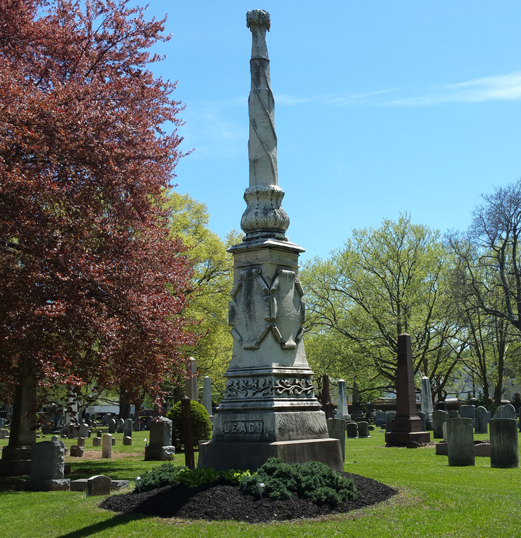
Majestic, unlike any other, monument to life in this cemetery.
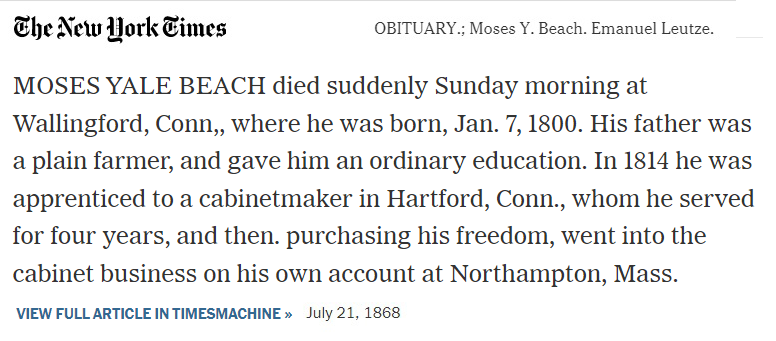
American Newspaper archives show this obituary repeated, in whole, or in part, citing the incorrect birthday from Vermont to Ohio to New Orleans over the subsequent weeks. Leutze’s source was likely William Hunt’s 1848 AMERICAN BIOGRAPHICAL SKETCH BOOK (Vol 1)
#MYB1800 Here is a link to the school that bears his name. It is proof that there is much yet to bear witness to about the Life and Legacy of Moses Yale Beach. Naming the school was disputed, in part, out of concern over who has the authority to do such a thing. Interestingly, the ‘what if’ scenario put forth about a precedent was ‘What if it is suggested to name a school after a well-liked janitor?’ (Oddly enough that honor would be saved for the Town Council Chambers in 2016) The contributions appeared not to be notable enough as there were many inclined to retain the name based on its location.
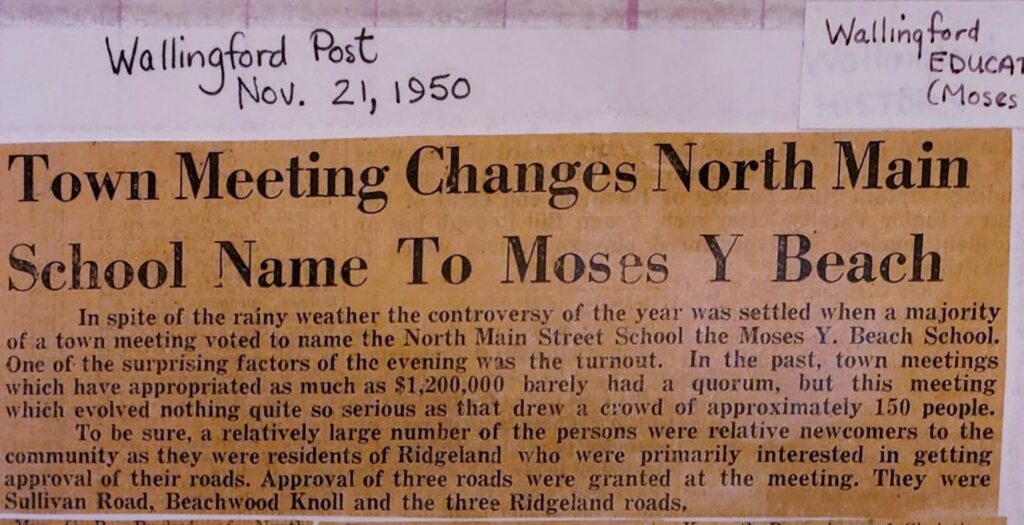
According to the Wallingford Post ( Nov. 21, 1950), The Freemen of Wallingford favored renaming the North Main St High School after Moses Yale Beach. Four men appeared to go on record in support of the name change: Rotarians Dr. George Craig and James S McGaughey (lived to 101). Mr. Emerson Leonard* and William Stevens described Beach as an honorable man and that something should be left of his heritage as he had given the land for the school. Stevens is said to have cited other contributions by Beach.
*Emerson Leonard was a farmer depicted in a B&W photograph by Delano, Jack, U.S. Farm Security Administration/Office of War (1940) as from Westville.
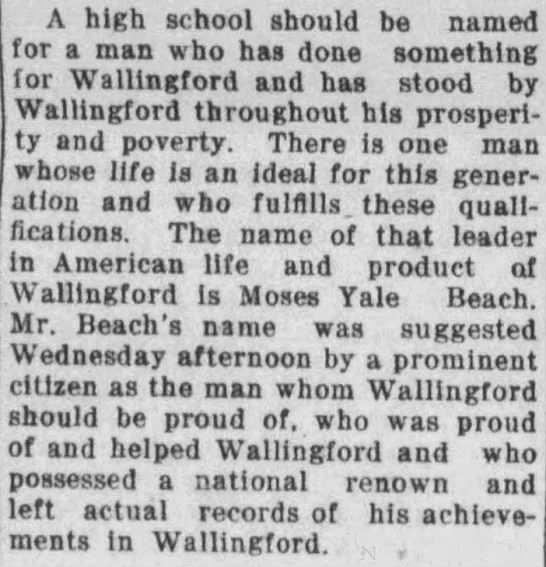
Aug. 17, 1916, a similar public conversation transpired over naming a school, the high school which would be named Lyman Hall. It appears that Mrs. William Goddard, a possible family relation of Mr. Hall, succeeded in holding up the virtues of signing the Declaration of Independence over a legacy to the world that would not be understood until nearly a decade later.
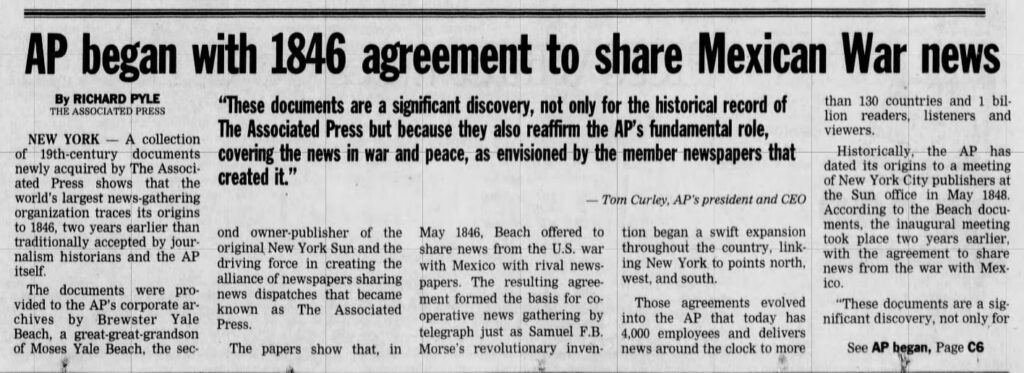
It is hard not to go down a rabbit hole as we unearth more about Moses Yale Beach, a man which our town fathers see as an owner of a mid-19th century mansion in Wallingford, and little else. Moses Yale Beach Revealed is the WPAA-TV contribution to @Wallingford350
Freeman Penny Quinn, 1st Free Speech Ambassador (A Freeman of Wallingford)
We are asking questions. You can join us!
Why is it that Moses Y. Beach is not heralded as a native son of Wallingford? His is a verifiable rags-to-riches story. Is there something in his climb to be among the elite of his time troubling? Are his pursuits, successes, and failures of concern to some? Are his political and religious views troubling? Or is it the absence of readily accessible information that provides the impasse?
Few people know much about the time in US History between 1800 and the Civil War. And maybe what we know is more myth, than fact. Can a better understanding of the role of inventions, media, religion, and politics; especially, as it relates to “All Men Are Created Equal” hold lessons for us today?
Absolutely.
We have a reading list and a few committed team members. But a few more folks willing to seek out primary source materials, read the books, and help with puzzling together the story are welcome to join in. There is an array of subtopics: Windsor Chairs & woodworking, pigeons, Poney Express & steamboats, woman journalists, newspaper history, hoax stories, yellow journalism, speed and news, texas, Mexican War, Antebellum America, Henry Austin builds a mansion in Wallingford, faith & war, slavery & war, family legacy (Friends of Stowes & Twain, Scientific American, NY Subway, Typewriter history). Write the team at myb@wpaa.tv Join us.
Citations
McNamara, Robert. “Penny Press.” ThoughtCo, Sep. 18, 2020, thoughtco.com/penny-press-definition-1773293. ; McNamara, Robert. “Benjamin Day.” ThoughtCo, Aug. 26, 2020, thoughtco.com/benjamin-day-1773669. ; McNamara, Robert. “James Gordon Bennett.” ThoughtCo, Aug. 26, 2020, thoughtco.com/james-gordon-bennett-1773663. ; apimagesblog.com, Text by Valerie Komor ; Valerie S Komor, Archivist, ASSOCIATED PRESS CORPORATE ARCHIVES, NEW YORK.,Primary Editor: Andrés Martinez. Secondary Editor: Jia-Rui Cook ; Prabook, registered trademark of World Biographical Encyclopedia, Inc. citing The Ely Ancestry: Lineage of Richard Ely of Plymouth, England, who Came to Boston, Mass., About 1655, & Settled at Lyme, Conn. in 1660; Lemelson-MIT ; The Sun,” The News Media and the Making of America, 1730-1865, accessed September 18, 2022 ; Moses Beach Revisted: A Critical Examiniation of His Wealthy Citizens Pamphlets, Edward Pessen, The Journal of American History Vol. 58, No. 2 (Sep., 1971), pp. 415-426 (12 pages) Published By: Oxford University Press ; https://app.memrise.com/course/700010/learn-history/390/

